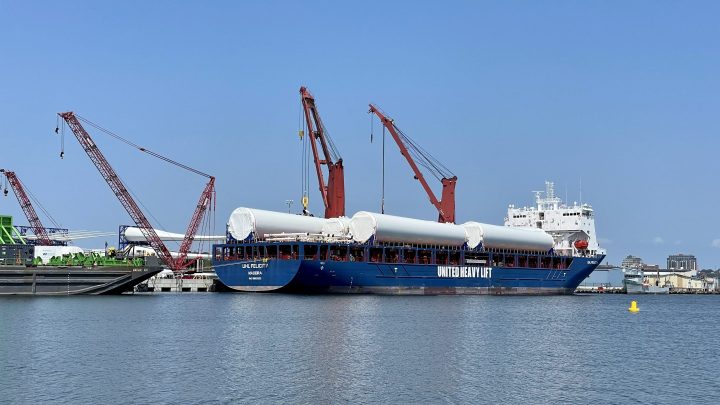
Clean energy industry faces economic headwinds
Clean energy industry faces economic headwinds

On a recent weekday, gulls circled overhead while a backhoe leveled a pile of dirt along the industrial waterfront of New Bedford, Massachusetts.
“We’re developing a port facility here to support offshore wind construction,” said Andrew Saunders, the president of the port, called the Foss Marine Terminal.
When it’s complete, Saunders plans to lease the port out to offshore wind developers. He’s betting it will become a launch pad for boatloads of seafaring workers who build the turbines more than a dozen miles out to sea.
“This facility will support those vessels during crew changes, grub, taking off garbage … Husbandry services is the best way to describe it,” said Saunders.
Offshore wind is a core pillar of the Biden administration’s push to remake the nation’s electric grid with renewable energy. The goal is to fight climate change and to provide cheaper power — once built, solar or wind farms typically have low operating costs since they don’t require fuel.
But building those clean energy projects in the first place can be expensive. And now, inflation and rising interest rates are making it harder for some projects to get off the ground.
That leaves folks like Saunders wondering when they’ll be able to cash in on the clean energy bonanza. In Massachusetts, developers for two of the state’s three approved offshore wind farms now say they can’t deliver power at the promised price.
“Those projects are underwater. They’re not financeable,” said Kris Ohleth, who leads the think tank Special Initiative on Offshore Wind, which supports responsible development of the industry.
Ohleth said developers proposed the wind farms three or four years ago. But then came a global pandemic and the war in Ukraine, and prices for labor and materials shot up. “It was just really too extreme for them to have ever planned for that level of risk,” she said.
As a result, developers can’t make the math work. Ohleth said it’s like if a contractor gave you an estimate to build a house back in 2019. “And then in 2023 you said to them, ‘okay, we’re ready. Please build us that house.’ They certainly wouldn’t be building it for the same number.”
The Federal Reserve has worked to calm inflation by hiking interest rates. But that’s also a problem for some new clean energy projects, because they’re often built with borrowed money.
“Debt makes up more of these projects than most people realize,” said Bernadette Johnson with the consulting firm Enverus. As interest rates rise, so does the cost of borrowing. “Now you have a more expensive project.”
Builders of solar farms in North Carolina and advanced nuclear plants in Utah have all blamed delays in part on interest rates. It’s hard to know just how bad the problem is — because Johnson says projects can get bogged down for a mix of reasons, like permitting delays or because there aren’t enough power lines to handle the new electricity.
“There’s a lot of ways for investments to go sideways,” said Johnson.
However, some projects are getting a boost in the form of clean energy tax credits from the Inflation Reduction Act that Congress passed last year. Plus, there’s fundamentally a massive demand for renewables.
“Everyone knows that’s where policy is headed. Everyone knows that’s where the technological direction is. The direction of travel is clear for clean energy,” said David Victor, a professor of innovation and public policy at UC San Diego. He said that in the long term, renewables will remain a strong investment.
Back in the port of New Bedford, Andrew Saunders wasn’t too worried about the recent slowdown in offshore wind projects. He said the wind is still at the back of the clean energy industry. “I’m very confident it’s gonna get built. I have to be. My wife is the divorce attorney, and if it doesn’t work out, then I’ll be in a lot of trouble.”
There’s a lot happening in the world. Through it all, Marketplace is here for you.
You rely on Marketplace to break down the world’s events and tell you how it affects you in a fact-based, approachable way. We rely on your financial support to keep making that possible.
Your donation today powers the independent journalism that you rely on. For just $5/month, you can help sustain Marketplace so we can keep reporting on the things that matter to you.


















